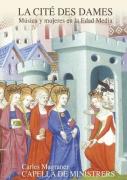Texte paru dans: / Appeared in:

Fanfare Magazine: 38:2 (11-12/2014)
Pour
s'abonner / Subscription information
Les abonnés à Fanfare Magazine ont accès aux archives du
magazine sur internet.
Subscribers to Fanfare Magazine have access to the archives of the magazine
on the net.
Capella de Ministrers
CDM1333

Code-barres / Barcode : 8216116213339
This lavish book (like those Alia Vox has been issuing for years) is the seventh such issue on this label, but the first one I have seen and the first one to arrive for review. Carles Magraner’s ensemble, made up here of two singers, five players, and seven additional participants (five singers and two players), is familiar from previous recordings. I had positive words for several of them, while demurring at his Victoria Requiem with instruments. This time the theme is women in music in the Middle Ages. In addition to the composers listed, the credits include Clarisas, Héloise (Abelard’s love), Gracia Baptista, Kassia, Blanche of Castile, Maroie of Dregnau, Anne Boleyn, Christine de Pizan, Florencia Pinar, Margaret of Austria, and Constance of Aragon, unfamiliar names in the guise of composer or, for some, in any other context. (The ninth-century Byzantine Kassia and the queen Constance of Aragon may be credited with composing the selections heard here, but the others, certainly including Christine de Pizan and Florencia Pinar, may have written at most the words.) Such collections as Codex las Huelgas, Codex Bamberg, and Carmina Burana are also represented. The 20 tracks are drawn from as many different sources.
The title of the book is the same as one written by Christine de Pizan at the beginning of the 15th century, possibly the first feminist manifesto, as much an exaltation of women as a denunciation of the men who show them nothing but contempt. Her “city” would be constructed and ruled by women of moral excellence and civic virtue. All of this is a handy framework for a collection of songs composed by women or closely connected with them. The singers are all women, understandably, and the singing and playing are lovely. The notes by Josemi Lorenzo Arribas, whose unspecified but presumably published thesis underlies the program, explain in some detail the place that each lady occupies in the unfolding presentation. The 120-page hardcover book is in Spanish and English, with some attractive illuminations from Medieval sources. The font is mercifully legible, a rarity in CD booklets today. I can imagine that many will see this as a perfect gift for the lady in their lives.
Cliquez l'un ou l'autre
bouton pour découvrir bien d'autres critiques de CD
Click either button for many other reviews


